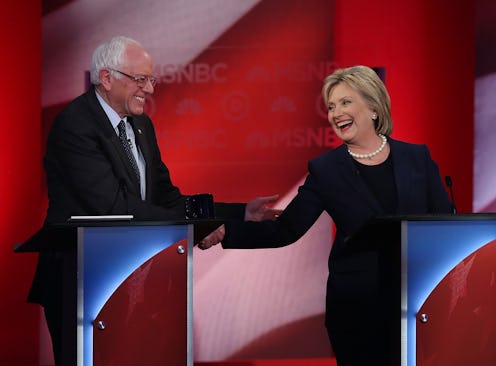News
This Was The Democrats' Best Debate Yet
Thursday’s Democratic debate was different from the rest in several regards. It was the first time Hillary Clinton and Bernie Sanders went one-on-one without anybody else on the stage. It was the first debate since Democrats actually started casting their votes. And it was the first time that Clinton and Sanders took the gloves off and really went at it. Not coincidentally, it was also the best Democratic debate so far. Both candidates are better off for it, and so is the party itself.
Consider, for example, an exchange the two candidates had on the definition of “progressive.” Initially, it seemed like utterly specious arguments with little bearing on actual issues, but it ended up giving both candidates, especially Clinton, important and useful practice for the general election.
Clinton likes to call herself “a progressive who gets things done,” but Sanders took issue with that recently, remarking that Clinton had called herself a moderate in the past. That is a legitimate question, and Sanders was right to bring it up. It’s obviously an issue for Clinton in a Democratic primary, because it casts doubt on her liberal bona fides. But if Clinton gets the nomination, she’ll almost certainly face that question from the opposite direction: Ted Cruz, or whoever, will bring up the moderate/progressive flip-flip and use it to paint Clinton as a craven power operator with no ideological center.
But Clinton had a pretty good response to this in the debate, and as an added bonus, it’s a response that will work just as well in a general election. In short, she asked voters to judge her by her record, not by labels. This was a clever and effective response, because it neutralized the “flip-flop” charge in a wholly genuine and convincing way. Yes, we should focus more on policies than on labels. What’s more, Clinton can very easily turn this into an attack on her eventual Republican opponent. (“Unlike Senator Cruz, I ask voters to look at my record of accomplishments, not at some ideological label that I tout around as a badge of honor,” she might say).
Sanders, for his part, didn’t actually attack Hillary on the moderate/progressive question as hard he could have — the issue was pushed harder by the moderators than anyone else. Like Clinton, he suggested that they focus on the issues instead, and this was both a valid point and a smart strategic move. Trying to tear Hillary apart over that would not have made either of them look very good, and wouldn’t have educated the voters, either. Furthermore, in the event that Sanders wins the nomination, he’ll need Clinton’s support, and accusing her of being ideologically bereft probably isn’t the best way to do that.
Later, the two had an exchange over Clinton’s ties to Wall Street. Here, the rhetoric between the two became even more heated and produced the only audible booing of the entire night. In the end, though, the back-and-forth both addressed an important question and made both candidates stronger. It started when Sanders accused Clinton of “having a super PAC that raised $15 million from Wall Street.”
“If we do not get a handle on money in politics and the degree to which big money controls the political process in this country,” Sanders continued, “nobody is going to bring about the changes that is needed in this country for the middle class and working families.”
Clinton’s initial response was rocky. She accused Sanders of waging “attacks by insinuation,” then asked him to “end the very artful smear that you and your campaign have been carrying out.” That’s the remark that elicited booing, and this is important. Clinton can’t afford to alienate Sanders’ supporters too much, because if she gets the nomination, she’ll need their votes to win the general election. With this remark, she discovered the upper limits of what is and isn’t going too far in angering Sanders’ base, and that’s going to helpful in the rest of the primary.
She eventually found her footing, using the Dodd-Frank financial reform bill as proof that having Wall Street donors doesn’t mean she’s bought and paid for. “President Obama signed [Dodd-Frank],” Clinton said, “pushed it through, even though he took donations from Wall Street, because he's a responsible president.” It’s an effective argument, and probably the best retort Clinton has come up with so far in response to this allegation.
Sanders’ reply, though, was arguably even stronger. “Let's talk about why, in the 1990s, Wall Street got deregulated,” he said. “Did it have anything to do with the fact that Wall Street provided — spent billions of dollars on lobbying and campaign contributions? Well, some people might think, yeah, that had some influence.”
Clinton didn’t really have a response for this. But you know what? That’s OK. The two had a substantive and serious debate about the role money plays in politics, Clinton was confronted directly (though not cheaply) on an issue that’s one of her weak points in the primary, and the two fought to what was roughly a draw. In other words, it was a good debate, and both candidates — but especially Clinton — are going to be better candidates for it.
Thursday proved that you can have an intense and even heated debate without the discussion turning ugly and hurting everybody involved. That’s a phenomenon that’s been notably absent in the Republican debates, which have largely devolved into childish food fights and competitions over who can conjure up the most rage at Obama. It would be farcical to claim that the GOP debates have strengthened the Republican Party for the general election, but the Democratic forums have most certainly served this purpose. Clinton and Sanders become more well-positioned for winning the presidency with every debate they have. Thursday was their biggest leap forward yet.
